

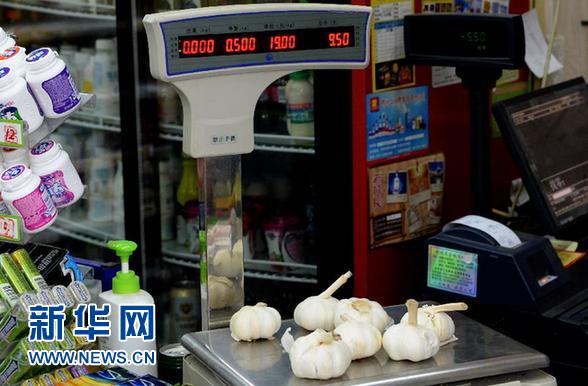 |
| Garlic price is 19 yuan per kilogram in a supermarket in Zhengzhou, Henan province on April 17, 2016. |
The Chinese market recently witnessed a sharp rise in garlic prices. Analysts believe that declining production and increasing demand are the decisive factors behind the rise, but speculators are also contributing to it.
Xinhua conducted investigations in several major producing areas, including Jinxiang County in eastern China's Shandong province. In Jinxiang, the acquisition price of garlic was about 4.7 yuan ($0.7) per kilogram last July, but the price rose 170 percent this March to 12.8 yuan.
The highest garlic price this year has already surpassed the peak price in 2010, another time when garlic prices surged unexpectedly, said Yang Jiahua, secretary general of a garlic industry association in Jinxiang.
Cui Xiaona, an agricultural products analyst, believes there are three factors contributing to the rise of garlic prices. Besides declining production and increasing demand, speculation is also a key factor.
"National production dropped by 8 to 10 percent in 2014, and this year it is expected to decline even further because of the cold wave at the end of 2015," she explained.
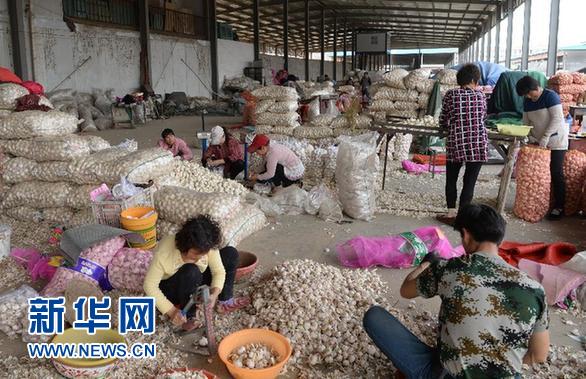
Sellers sort out garlic in a market in Zhongmou, Henan province.
Most dealers insist that market supply and demand are determining the market price, but they also admit that speculation is a driving force. Some speculators made millions of yuan from this round of speculations, and several made over 100 million yuan. At the same time, others suffered heavy losses.
Some dealers are gambling to increase their profits. For instance, a number of property agents in northeast China and Shanghai purchased a huge amount of garlic and bid up the price in March and April when supply is relatively short, creating the expectation of rising prices, according to Liu Shaochen, president of a cold storage industry association in Zhongmou County, Henan province.
The investigation also found that the expectation of a reduction in garlic output has contributed to the rise. According to a dealer in Jinxiang, information about the reduction dates back to a message from an industry conference held in Shandong at the end of February, saying that the stored garlic nationwide only amounted to 600,000 tons.
Rumors about a rise of garlic prices consequently began to spread, but the message has been greatly exaggerated and even exploited since it was first released. Dealers are using all kinds of tactics to jack up the price, an insider said.
Analysts believe that more authoritative information should be released in order to reduce speculation and stabilize the market price.
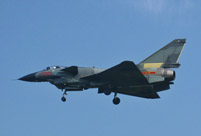 The evolution of J-10 fighter
The evolution of J-10 fighter Top 10 Asian beauties in 2016
Top 10 Asian beauties in 2016 What's happening in Xisha Islands?
What's happening in Xisha Islands? When female soldiers meet flowers
When female soldiers meet flowers North Sea Fleet conducts drill in West Pacific Ocean
North Sea Fleet conducts drill in West Pacific Ocean Old photos record the change of Sichuan over a century
Old photos record the change of Sichuan over a century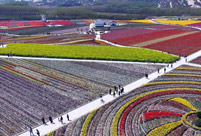 Breathtaking aerial photos of tulip blossoms in C China
Breathtaking aerial photos of tulip blossoms in C China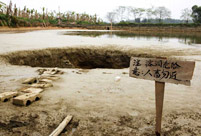 Horrific: Pit swallows 25 tons of fish overnight
Horrific: Pit swallows 25 tons of fish overnight Vietnamese Su-30 fighters fly over Nanwei Island in South China Sea
Vietnamese Su-30 fighters fly over Nanwei Island in South China Sea Top 20 hottest women in the world in 2014
Top 20 hottest women in the world in 2014 Top 10 hardest languages to learn
Top 10 hardest languages to learn 10 Chinese female stars with most beautiful faces
10 Chinese female stars with most beautiful faces China’s Top 10 Unique Bridges, Highways and Roads
China’s Top 10 Unique Bridges, Highways and Roads Arson death video sparks outrage
Arson death video sparks outrage Temple turns itself into a nursing home in fast-aging China
Temple turns itself into a nursing home in fast-aging China Hong Kong Orgasmo Festival to call attention to erotic art and sex
Hong Kong Orgasmo Festival to call attention to erotic art and sex Female expats share their thoughts on violence against women following a recent attack
Female expats share their thoughts on violence against women following a recent attackDay|Week